- Home
- Martin Archer
Castling The King
Castling The King Read online
Book nine
Castling the King
The late afternoon sun coming in through the wall openings provided just enough light for the nine well-dressed and heavily bearded men sitting on the wooden benches running along both sides of the long table in the great hall of Rougemont Castle in Exeter. They’d just heard someone suggest a name, and each looked at the others in total surprise to see what they thought of it.
Talking about people was something the nine of them had done often for the past two days, as name after name had been proposed. This time—perhaps for the first time—they were all surprised. Several were so shocked their jaws dropped.
“You can’t be serious! You want him to be king?”
Their meeting was secret and well it should be. All the men around the table were English barons, and all were opposed to King John’s efforts to impose common laws throughout England and open the roads to everyone without requiring them to pay tolls to the barons whose lands the roads cross.
They also didn’t like the king’s ever-higher taxes and the scutages he required from them to help pay for his never-ending military efforts to reclaim what the king considered to be his hereditary lands in Normandy and France.
The barons were desperate to save their powers and coins. They want someone to replace John as king, even if it means they have to fight a civil war to get rid of him. That their crops have just failed for the second year in a row in the midst of England’s severe famine was never once discussed or even mentioned.
Chapter One
William
My scarred face and slight limp shocked everyone, even though Yoram had written to alert my priestly brother Thomas about my wounds, and Thomas had quietly spread the word to the rest of my family. It surprised me to realise how much I had forgotten about being wounded until Helen gently touched the jagged scar and hugged me overly long.
“Are you trying to tell me I need my beard trimmed?” I whispered into her ear with jest in my voice and as big a smile as I could manage. Then Anne and Thomas and everyone else closed in around me, and they too pretended they didn’t see the long, raw scar. We all seemed to be talking at the same time as we walked up the cart path along the river to the castle.
To tell the truth, my somewhat-changed face doesn’t bother me much at all. Now I’ll always look like a veteran fighting man to my men instead of an untested knight whose armour is still shining from lack of use. Not that I’m a knight, of course, just a former serf with a title and some worthless lands in Cornwall I bought off the king with my prize money when he was only Richard’s landless regent and desperate for coins of his own.
My battered face and slight limp were soon forgotten in the revelry and goodwill which always seems to accompany a homecoming after a successful season of campaigning. Everyone was soon paying more attention to the presents and three half-grown cats Tori brought from Constantinople and eyeing the crates of gold and silver icons the archers were carrying ashore under Harold’s watchful eye.
No one asked about the crates coming off Harold’s galley, but somehow everyone knew it had been another good year for our company of archers—and it certainly had, despite me getting my face cut up right proper and a limp put on my right leg by someone sticking his sword so far through it my dear, sweet Tori had to have one of my archers help her pull it out.
All my little ones and women were present, but my oldest son and heir was not. I raised my eyes in a question to my brother Thomas. He smiled back most reassuringly and mouthed “George is fine. I’ll tell you about it later.”
*****
Earlier today we’d all waved and shouted our greetings as Harold’s galley rowed past one of our cogs coming in from the east, laden with corn and dried fish to help fight the famine threatening the lands we’d bought with our prize and refugee transporting monies. Its sail had been furled and its anchor away; it was waiting for high tide in the light rain at the mouth of the Fowey.
When the tide comes, one of the archer company’s galleys stationed here in Fowey Village’s little harbour will tow the cog up the river to the tents and hovels of our archers’ training camp where the water of the Fowey shallows just below Restormel Castle. It’s the camp where the company’s archers we are now starting to call Marines are being trained to fight under the direction of my land-fighting lieutenant and friend, Henry, the former crusader and galley slave from Lewes.
Henry was one of the galley slaves Thomas and I freed when we bought our first two galleys—the galleys what we bought off the poxed captain with the bezants and other coins we took off the fleeing Bishop of Damascus. That was right after Thomas killed the bishop, and rightly so, when he tried to murder us in in an effort to avoid paying the archers for fighting to defend Lord Edmund’s crusader castle in Syria’s Bekka Valley.
As you might imagine, the famine which has fallen on England and the food situation in Cornwall was weighted heavy on my mind when we reached our riverside camp and tied up at our little floating wharf. It was the first thing my priestly brother and I talked about after the three sisters who are my women climbed up the stone stairs to talk about womanly matters in the three family rooms above the great hall where they live with our children. My son George lives with his fellow students in the room next to the castle’s curtain wall where my brother teaches them to scribe and do their sums and such.
“It’s still bad, William, very bad,” Thomas said.” But not near as bad as it was before we began bringing in food and feeding people. Fish catches are poorly again this year, and the crops have entirely failed. There is famine everywhere in England except here in Cornwall, and we’re not yet to Christmas. We’ve held it off here with the corn and dried fish we’ve been bringing in on our cogs and galleys, but things are difficult elsewhere in England. People are reported to be starving to death and killing witches in Yorkshire and Sussex.”
Then he explained my son’s absence.
“George and the four older boys in my school have been a tremendous help. Whilst you were gone I ordained them as priests and made them up to sergeants, and then sent them out to the parishes to distribute the food we’ve been bringing up the Fowey. Some of our most dependable archers go with them as guards and hostlers. They are delivering the food to the parishes and making sure it is being properly distributed.”
Thomas continued after a pause whilst he took a sip of ale.
“It’s good experience for the boys, telling others what to do and being responsible and such. George left two days ago with some supplies for Penzance. He should be reaching there about now.
“We’re using the parish churches as the food distribution centres, with at least one of our more dependable archers staying in each church as an acting sergeant to make sure the food’s passed out fairly to everyone and all the able-bodied men and women provide their labour for what their families receive.
“At first I tried to use local people and the leaders of the hundreds to pass out the famine food but it didn’t work well. Some of them tried to sell the food, and others tried to keep people they didn’t like from getting it for one reason or another.
“One of the bastards holding back the food was the priest at Penzance, if you can believe it,” Thomas said.” Another was a Bodmin monk who ran away when he heard what happened to the priest.
“Selling the food we were sending them, weren’t they, and letting the people starve if they wouldn’t or couldn’t pay. The priest even offered me a share of the coins he’d been paid. I topped the bastard on the spot and pissed on his grave instead of burying him with the proper words. It’s God’s truth. I was pissing on his grave when I came up with the idea of making George and the older boys up to sergeants and using them to pass out the food.”
> “Aye Thomas, I can believe it about your fellow churchmen, yes I can,” I said.” It’s always been that way, hasn’t it? So how are things going now that you’re using your students and our men instead of the local folk?”
“Actually it seems to be working out rather well, I think. Everyone who’s hungry and shows up gets a full ration of bread and dried fish for the day, and the able-bodied men and women all have to work. Mostly they’re working on the roads, although some are working on strengthening our keeps and walls and building new bridges. Quite a few families have come here for the famine food, even some of the people from the woods with the words no one can understand.”
“Well that’s good news. Yes it is. And having more men available to work raises the possibility of doing some things we’ve talked about before, building permanent barrack lines for the archers and their apprentices and putting up good cottages on loan lands for our lieutenants and senior sergeants. What do you think? Should we start building them now we’ve got more men off the famine?”
“Aye, and don’t forget we’ll need some for our injured men and our widows and orphans.”
*****
Thomas and I and the rest of my lieutenants spent the day walking about our camp and the castle grounds, talking about many things—and especially about how George and the other boys in Thomas’s school are progressing and how they might be employed in the company in the years ahead. It’s a discussion Thomas and I have been having for years, ever since I became the captain of the company just before we went over the wall of Lord Edmund’s castle years ago to escape the Saracens. I’d led the men over the wall in the dark of night right after I gave the dear old man a soldier’s mercy for his terrible wound.
Thomas informed me he now has almost thirty boys being taught to speak Latin and scribe and sum and such. He told me, with a good deal of satisfaction in his voice, that George and the four oldest boys were ordained as priests last month and are ready to permanently join the Company of Archers as three-stripe sergeants, even if they look to be a mite too young for such a rank and to be priests.
Thomas ordained them? My brother has come a long way since the abbot’s assistant took a fancy to him and carried him off to the monastery, where the monks taught him to scribe and sum. He bought the vacant bishopric in Cornwall off the church with some of the bezants and other coins we took out of the Holy Land. Thomas being a bishop is important; it means he can say a few prayers and ordain anyone he wants as a priest if he has a mind to do it.
“It was easy to say the words to make them priests, because George and the boys in my classes were taught how to talk and scribe Latin and pray at people, in addition to how to push a bow and raise a pike. And you never can tell, can you; claiming to be a priest and being able to say the prayers most proper might help keep them alive sometime. It kept me alive when the Venetians took me, didn’t it? Afraid of pissing off the church or not getting to heaven, they were. I don’t know which it was. Maybe both.”
Then we talked about something important as we walked back to the castle for an evening meal—where and how George and the other boys should serve when they are finished with their schooling and go on active duty with the company. It was time for a decision, and it was an easy one because we’d already discussed it so many times previously.
Each of the boys will begin his career in the company by serving a succession of one-year apprenticeships as sergeants and scribes under each of our four lieutenants and our two most important senior sergeants, all of whom would benefit from having one of the boys with them at all times because they can neither read nor scribe. The two important senior sergeants—Raymond who sergeants the Horse Archers at Okehampton and Randolph, the sergeant captain of our trading and money post in Rome—were among the thirteen archers who survived of the original one hundred ninety-two in our company.
If we stick to our plan, all the boys being taught to sum and scribe in Thomas’s school will be promoted to senior sergeants and sew four stripes on their tunics after they finish their six years of apprenticeships. Then they’ll serve wherever we need them and their abilities and interests take them.
We were pleased and smiled at each other about George and the boys Thomas recruited along the way to join his school. Getting George ready to move ahead in England has been what we’ve been determined to do ever since he was a little tyke. It was all we ever talked about during those dark days when the Saracens were besieging Edmund’s castle and it looked as though we’d all go down. We vowed we’d spend our lives getting George and the surviving archers ahead if we escaped when we climbed over the castle wall in the dark and ran for our lives.
Chapter Two
The next king.
“He’s the man you think should be the king? You can’t be serious,” scoffed one of the men.
The late afternoon sun was fading and the candles being lit by the servant from the village flickered as the men sitting around the table in the great hall of Exeter’s Rougemont Castle looked at each other once again. They had done so repeatedly for the past two days as name after name had been proposed. They were meeting in secret and rightly so; all were English barons with substantial holdings, and all were opposed to King John’s efforts to impose common laws and penalties and open the roads to everyone without paying tolls. They were also unhappy about the king’s ever-higher taxes and the scutage he required to help pay for his endless efforts to regain his family’s hereditary lands in Normandy and southern France.
What united the barons was the idea that King John must go. But there was no agreement at all as to who should replace him. Each wanted to take the crown for himself, and each secretly feared one of his neighbours or enemies would get it and make his condition even worse.
“Well,” said the Earl of Devon, “why not Phillip of France? We need a king, and he’s got more men than all of us put together. And he certainly hates John, probably even more than we do. Best of all, he’s likely to stay in Paris with his women and not object to each of us having our own laws and collecting our own tolls. We could make it a condition of supporting him.”
“But Phillip’s a Frenchman, a Capetian!” said a portly man at the end of the table.” We’ve been fighting the Capetians over Normandy since Edward died without an heir and William came over from Normandy and defeated Harold at Hastings. They’ve been our enemy since before my grandfather’s time.”
“They’re never been my enemy, and they’ve never been yours; they’re the enemy of the king and his family,” replied the earl, “not of mine or yours. I don’t know about you, but I couldn’t care a rat’s arse about whether the king owns Normandy or not. Do you?”
“Phillip could do it,” interjected someone with the strange and distinct accent of Norman Yorkshire.” He’s got enough men, and he’ll have more when some of the French knights come back from Constantinople now that it’s fallen and the crusade has been called off.”
“Well, that’s a problem, isn’t it?” said another of the men.” Any Frenchmen who come here will do so because they don’t have land in France or because they’re crusaders who didn’t get lands of their own from the Greeks when they helped take Constantinople. They’ll expect to be rewarded with land here if they help us defeat John.”
“The French knights having land won’t be a problem, the earl offered, if Phillip agrees to our fiefs and our rights in advance, including the additions from John’s land and those of his supporters we’d rightly claim for ourselves.”
“Aye. It won’t be a problem,” agreed the Yorkshire lord, “but only if we get what we want and Phillip uses what’s left of the king’s lands to give many small fiefs to his knights as freeholds to make them petty lords. It would weaken his power to control things here in England if he had no vassals here, wouldn’t it?”
“Many small freeholdings on what is left of John’s lands and the lands we don’t take from his supporters would be acceptable to me,” Devon said, “but only if our heirs can keep our lands as
freeholds without having to pay a fee to the king in order to inherit. What would weaken us all and not be acceptable would be if Phillip kept all of John’s lands for himself or put a great lord or two over most of them.”
“Aye, Devon, you’re right,” the Yorkshire lord agreed.” New lords who are too small to trouble us would be fine; one or two big enough to take John’s place and dominate us, instead of the other way around, would not.”
Then the assembled barons gathered around the rough parchment map on the wooden table and pointed and argued and told each other what lands they wanted from those of the king and the king’s supporters. No one argued when the Earl of Devon said he wanted Cornwall and the north of Devon, including Okehampton.
******
Word of the meeting of the dissident barons at Rougemont Castle and their plans for a new king didn’t reach us as quickly as it should have.
Rougemont is at the end of the old Roman road from London which ends forty miles short of Cornwall and goes right under the nose of Okehampton castle before it turns south to Rougemont and Exeter. We’ve held Okehampton ever since the Courtenay lord who once held it as a freeholder and some of his lordly friends and their retainers rode out to attack us because we were travelling on the road without paying him a toll or getting his permission.
Courtenay and his noble friends learned something important about longbows and our new bladed pikes when they attacked us; namely, that in the hands of trained men they can be used to kill foolish lords who come out of their castles to attack travellers on the king’s roads.
As a result of Courtenay’s folly, Okehampton now belongs to us because, as the various parchments quickly prepared and registered in the parish church by my fast-thinking brother clearly show, Courtenay sold his interest in the castle and its lands to me just before he departed. It would look to anyone who searched the parish records that Courtenay did so just before he got himself married to Isabel of Gloucester and sold his castle and its lands so he would have enough coins in his pouch to go off crusading in the Holy Land.

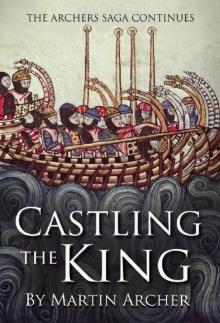 Castling The King
Castling The King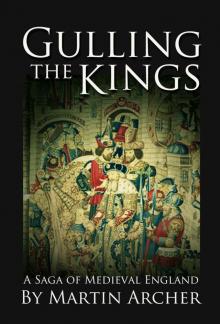 Gulling The Kings
Gulling The Kings Israel's Next War
Israel's Next War Our Next Great War
Our Next Great War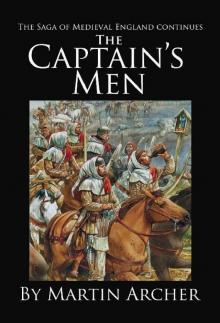 The Captain's Men
The Captain's Men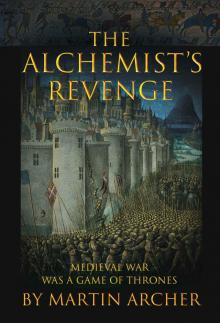 The Alchemist's Revenge
The Alchemist's Revenge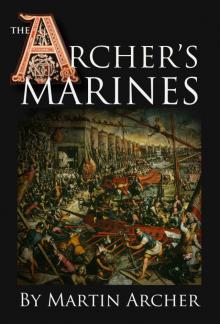 The Archer's Marines: The First Marines - Medieval fiction action story about Marines, naval warfare, and knights after King Richard's crusade in Syria, ... times (The Company of Archers Book 5)
The Archer's Marines: The First Marines - Medieval fiction action story about Marines, naval warfare, and knights after King Richard's crusade in Syria, ... times (The Company of Archers Book 5)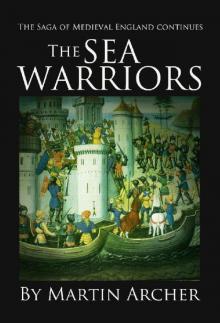 Sea Warriors
Sea Warriors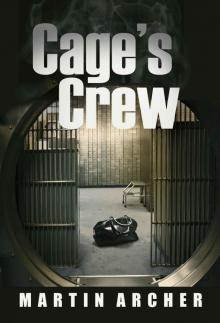 Cage's Crew
Cage's Crew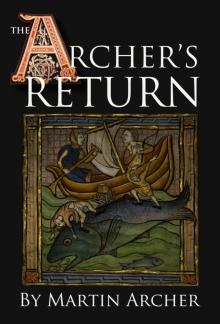 The Archer's Return: Medieval story in feudal times about knights, Templars, crusaders, Marines, and naval warfare during the Middle Ages in England in the reign of King Richard the lionhearted
The Archer's Return: Medieval story in feudal times about knights, Templars, crusaders, Marines, and naval warfare during the Middle Ages in England in the reign of King Richard the lionhearted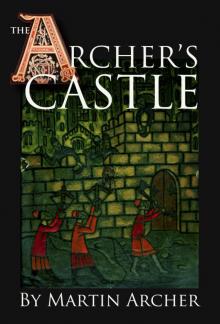 The Archer's Castle: Exciting medieval novel and historical fiction about an English archer, knights templar, and the crusades during the middle ages in England in feudal times before Thomas Cromwell
The Archer's Castle: Exciting medieval novel and historical fiction about an English archer, knights templar, and the crusades during the middle ages in England in feudal times before Thomas Cromwell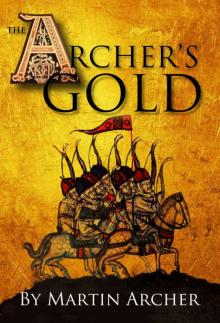 The Archer's Gold: Medieval Military fiction: A Novel about Wars, Knights, Pirates, and Crusaders in The Years of the Feudal Middle Ages of William Marshall ... (The Company of English Archers Book 7)
The Archer's Gold: Medieval Military fiction: A Novel about Wars, Knights, Pirates, and Crusaders in The Years of the Feudal Middle Ages of William Marshall ... (The Company of English Archers Book 7)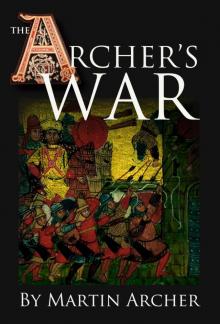 The Archer's War: Exciting good read - adventure fiction about fighting and combat during medieval times in feudal England with archers, longbows, knights, ... (The Company of English Archers Book 4)
The Archer's War: Exciting good read - adventure fiction about fighting and combat during medieval times in feudal England with archers, longbows, knights, ... (The Company of English Archers Book 4)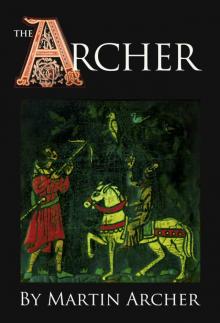 The Archer: Historical Fiction: exciting novel about Marines and Naval Warfare of medieval England set in feudal times with knights,Templars, and crusaders during Richard the lionhearted's reign
The Archer: Historical Fiction: exciting novel about Marines and Naval Warfare of medieval England set in feudal times with knights,Templars, and crusaders during Richard the lionhearted's reign